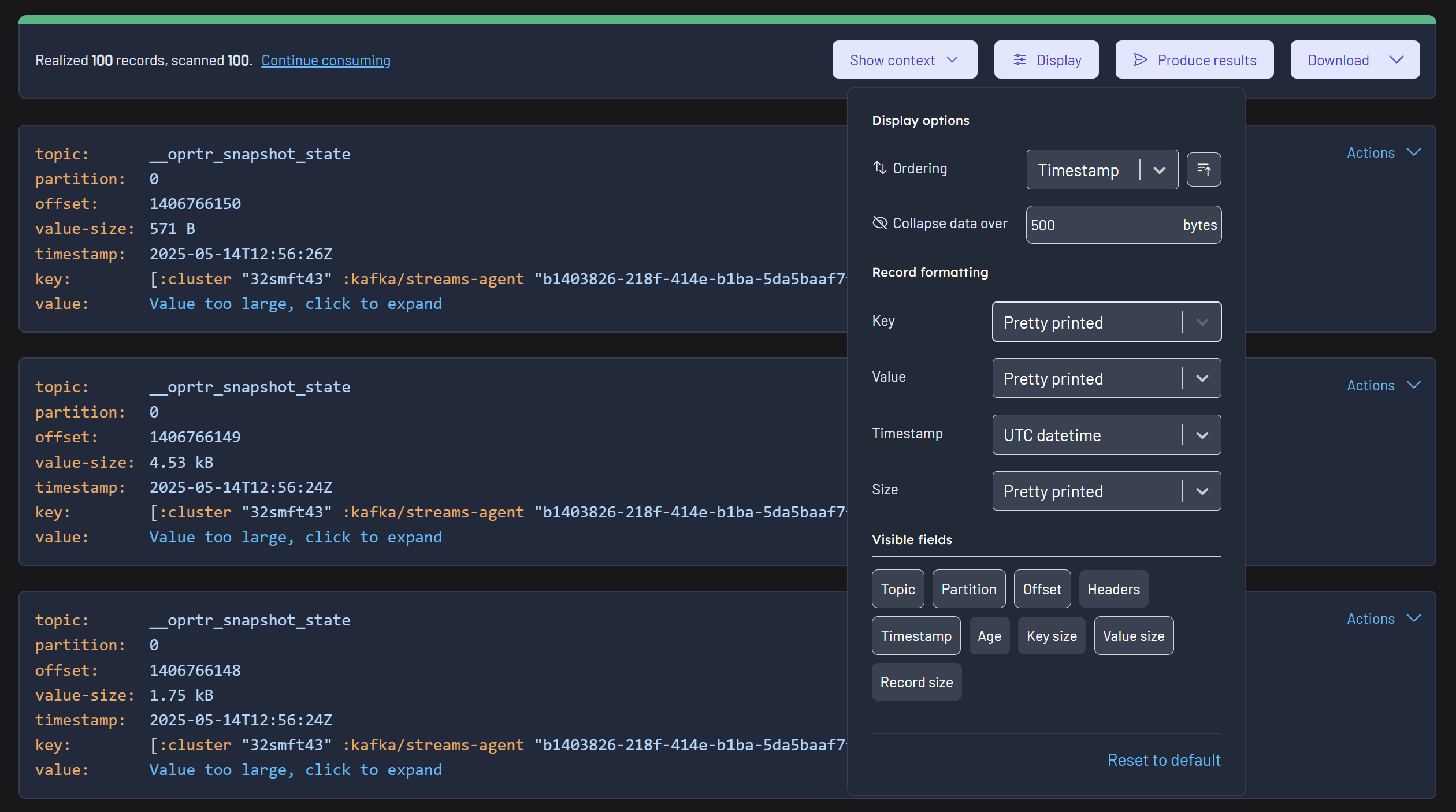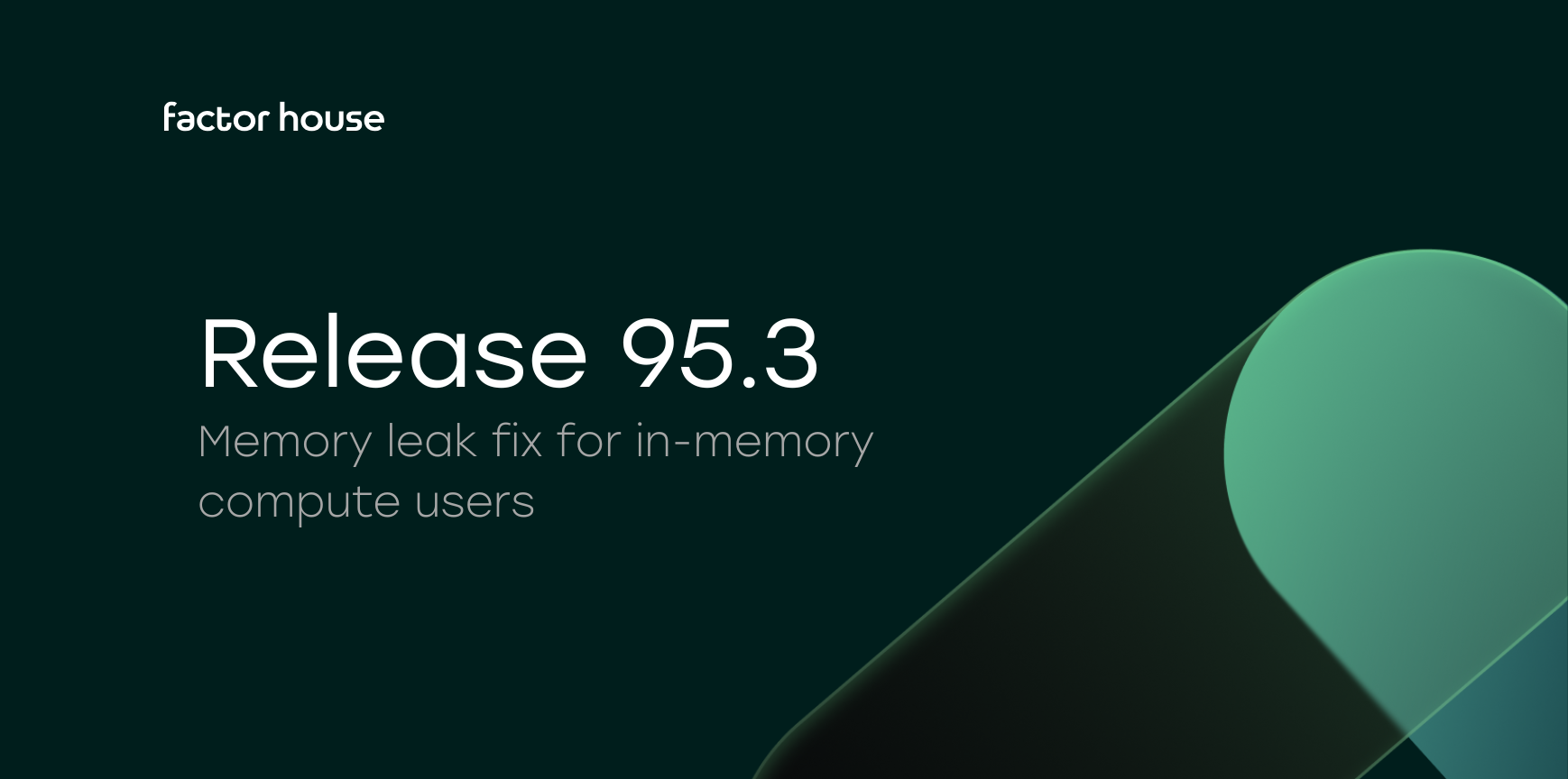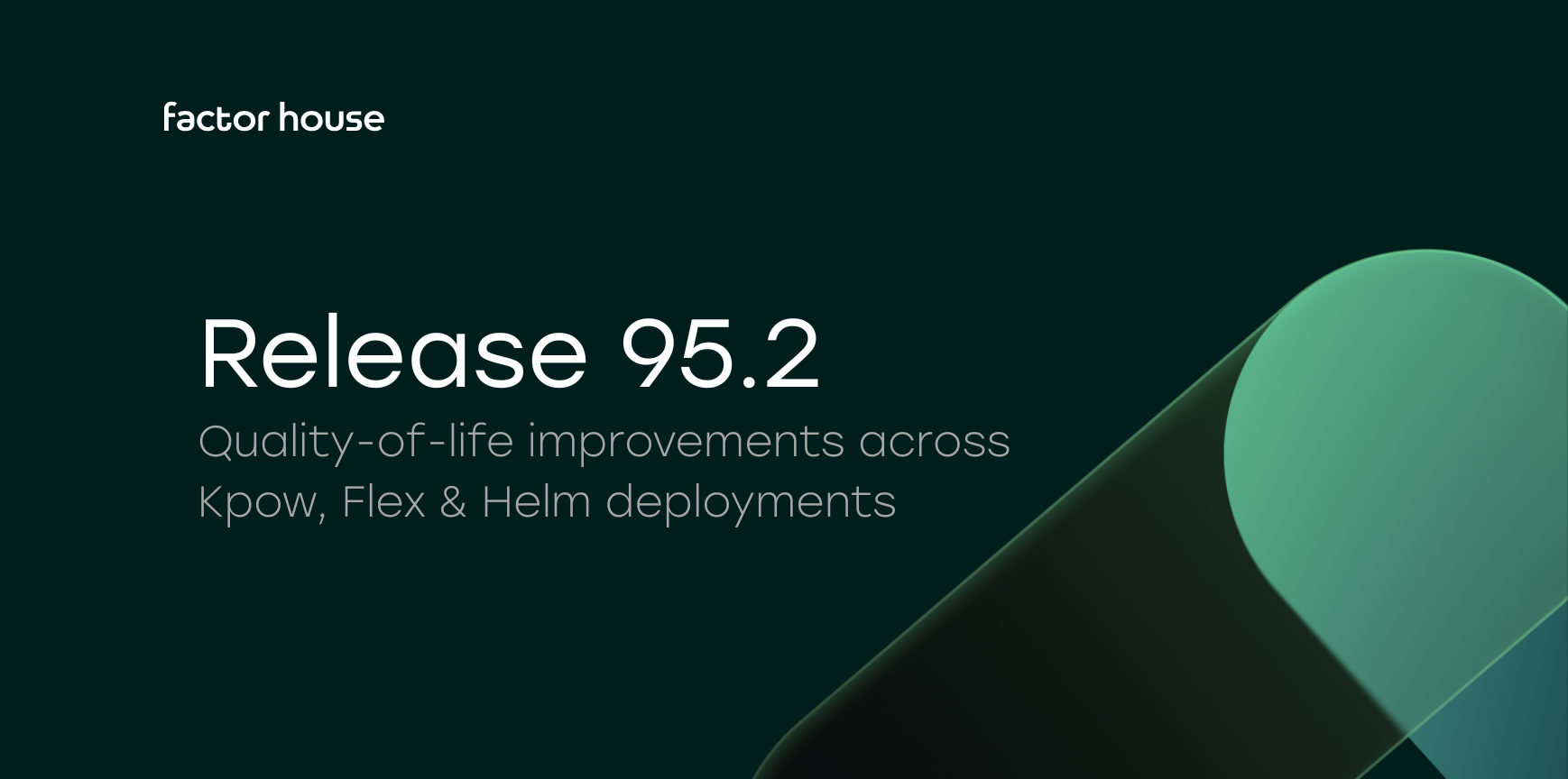
Release 94.2: Google MSK, Data Inspect, and A+ Docker Health

Release Info
Kpow can be found on Dockerhub
docker pull factorhouse/kpow:94.2View our Docker quick start guide for help getting started.
Kpow can be found on ArtifactHub
Helm version: 1.0.60
helm repo add factorhouse https://charts.factorhouse.io
helm repo update
helm install --namespace factorhouse --create-namespace my-kpow factorhouse/kpow --version 1.0.60 \
--set env.LICENSE_ID="00000000-0000-0000-0000-000000000001" \
--set env.LICENSE_CODE="KPOW_CREDIT" \
--set env.LICENSEE="Your Corp\, Inc." \
--set env.LICENSE_EXPIRY="2024-01-01" \
--set env.LICENSE_SIGNATURE="638......A51" \
--set env.BOOTSTRAP="127.0.0.1:9092\,127.0.0.1:9093\,127.0.0.1:9094" \
--set env.SECURITY_PROTOCOL="SASL_PLAINTEXT" \
--set env.SASL_MECHANISM="PLAIN" \
--set env.SASL_JAAS_CONFIG="org.apache.kafka.common.security.plain.PlainLoginModule required username=\"user\" password=\"secret\";"
--set env.LICENSE_CREDITS="7"View our Helm instructions for help getting started.
Kpow can be found on the AWS Marketplace
View our AWS Marketplace documentation for help getting started.
Kpow can be downloaded and installed as a Java JAR file. This JAR is compatible with Java versions 17+.
View our JAR quick start guide for help getting started.
Kpow can be downloaded and installed as a Java JAR file. This JAR is compatible with Java versions 11+.
View our JAR quick start guide for help getting started.
Kpow can be downloaded and installed as a Java JAR file. This JAR is compatible with Java 8.
View our JAR quick start guide for help getting started
For more information, read the Kpow accessibility documentation.
This minor release from Factor House introduces support for GCP MSK and new feature improvements such as data inspect display options, AVRO Date Logical Type formatting, flat CSV export, and fixes a bug in consumer offset reset!
Read on for details of:
- Support for Google Cloud Managed Service for Kafka
- Versatile data inspect display options
- Improved support for AVRO Date Logical Types
- New flat CSV export format for data inspect
- Even faster frontend with React and Tailwind migrations
- New open-source Clojure libraries!
- “A”-rated Docker health score
- Bug fixes with consumer offset reset
👏 Special thanks to our users who provided feedback and contributed to this release!
Google Cloud MSK Support
Google Cloud Managed Service for Apache Kafka offers a fully managed Apache Kafka solution, simplifying deployment and operations for real-time data pipelines.
Kpow now offers full support to monitor and manage your Google Cloud Kafka clusters. Learn how to Set Up Kpow with Google Cloud Managed Service for Apache Kafka.
Versatile Data Inspect Display Options
Data inspect is absolutely Kpow's most used feature. It made perfect sense, therefore, to enhance it with the following display options:
- Order by:
- Timestamp
- Offset
- Collapse data greater than [x] kB
- Key and Value display as
Pretty printedorRaw - Timestamp format:
- UNIX
- UTC Datetime
- Local Datetime
- Record size display as
Pretty printedorInt - Set visibility for fields: Topic, Partition, Offset, Headers, Timestamp, Age, Key size (bytes), Value size (bytes)
Display options are persistent in local cache for multi-session use.
Field visibility carries over to data export as well. Fields marked as not visible will be excluded in data export.
To use these options click Display in the menu bar atop the search results to open the Display options menu. For help, see updated docs: Data inspect

Improved Support for AVRO Date Logical Types
Previously, Date Logical Types in AVRO schemas would only display as integer values. This is not a human-readable timecode and limits filtering abilities in data inspect by requiring an integer input instead of allowing more advanced date-time representations.
In the 94.2 release, AVRO Date Logical Types can now be formatted to and from date-time Strings. Date manipulation functions have been built into kJQ as well, to enhance your data inspect filtering (see updated docs: Date Filtering with 'from-date').
A sample AVRO schema using this feature is:
{
"type": "record",
"name": "liquidity-update",
"fields": [
{
"name": "id",
"type": "string"
},
{
"name": "timestamp",
"type": {
"type": "int",
"Logical Type": "date"
}
},
{
"name": "pool",
"type": "string"
},
{
"name": "nodes",
"type": "string"
}
]
}Flat CSV Export Format
An option has been added to data inspect for flat CSV export. This has been a requested feature that will enable better human-readability and processing of JSON-serialized records. Rather than the key/value being an escaped JSON object:
key:
{
"id": "c8b3256f-be66-436a-a575-007588d7a9a3"
}
value:
{
"id": "c8b3256f-be66-436a-a575-007588d7a9a3",
"timestamp": "2025-05-14",
"pool": "CSX-JBN",
"nodes": "7-2-10-1"
}It equates to the following in flat CSV format:
key, value.id, value.timestamp, value.pool, value.nodes
{"id" "c8b3256f-be66-436a-a575-007588d7a9a3"}, c8b3256f-be66-436a-a575-007588d7a9a3, 2025-05-14, CSX-JBN, 7-2-10-1The exported output from a number of such records is therefore:

Notice that only the value fields are exploded into column format (not the key), and that they are alphabetically ordered for easier navigation.
React and Tailwind Migrations + New Open Source Libraries
The Kpow UI is known for being oh-so-fast, and it just got snappier with our migration to React 19 and Tailwind 4.0.
With this migration we preserve our gold standard of web accessibility (WCAG 2.1 AA Compliant), while also ensuring that our products can scale under high-demand applications, exhibiting even better efficiency than prior versions (with roughly a quarter of commits relative to the former Reagent-mediated version, under the same conditions).
To achieve this, we built two new open source ClojureScript libraries that will serve the wider Clojure community. The purpose of these libraries is to preserve the spirit of Reagent and re-frame, but modernize their foundations to align with today's React.
Our new libraries for the Clojure community are:
- HSX: a Hiccup-to-React compiler that lets us write components the way we always have, but produces pure React function components under the hood.
- RFX: a re-frame-inspired subscription and event system built entirely on React hooks and context.
HSX and RFX are more than just drop-in replacements — they’re the result of over a decade’s experience working in ClojureScript UIs. As a result, our products run faster, our code is easier to rationalise, and our products scale even more efficiently.
We invite you to try HSX and RFX, and to learn more about their development journey: Beyond Reagent: Migrating to React 19 with HSX and RFX
“A”-Rated Docker Health Score
Due to excellent work from our dev team, our Kpow container has received an “A” Docker Health Score. Our engineers are proud to present software that you can trust is secure, well maintained, and efficient, giving you confidence that our tools to help you manage your critical data-streaming pipelines meet stringent quality standards.

Consumer Offset Reset
This release fixes a regression in 94.1 where resetting a consumer group offsets could fail with an unexpected error.
Consumer offset management plays a vital role in controlling consumer group behavior. For an updated in-depth instructional, see: Consumer Offset Management in Kpow
Release v94.2 Changelog
See the Factor House Product Roadmap to understand current delivery priorities.
Kpow v94.2 Changelog
See the full Kpow Changelog for information on previous releases
- Added support for Google Cloud Platform Managed Kafka Service
- Fixed snappy compression operation with strict security policies
- Fixed consumer offset reset bug
- Updated Helm chart link to point to correct repo
- Connectors:
- Improved error messaging for stopped connectors
- Fixed "Copy as JSON" and "Copy as cURL" request structure bug
- Fixed link to "POST/connectors" to navigate to the relevant section
- Data inspect:
- Introduced option to expand/contract large messages
- Improved handling of AVRO Date Logical Type
- Introduced new display options configuration
- Introduced ability to export data in flattened CSV format
- User interface:
- Migrated to Tailwind 4.0
- Migrated to new HSX and RFX framework libraries - a snappier UI!
- Fixed "Description" button placement on topic creation UI
- Fixed chart line visibility changes on mouse hover in dark mode
- Error handling:
- Improved error logging for scheduled mutations
- Improved error messaging for stopped connectors
- Documentation:
- Updated screenshots on both data inspect and data produce pages
- Updated docs to reflect changes new data inspect features
- Amazon MSK integration added to sidebar navigation in doc tree
- Documented correct snappy compression configuration
Flex v94.2 Changelog
See the full Flex Changelog for information on previous releases
- Various UI + UX bugfixes
- Migrated to Tailwind 4.0
- Migrated to new HSX and RFX framework libraries - a snappier UI!

Release 95.3: Memory leak fix for in-memory compute users
95.3 fixes a memory leak in our in-memory compute implementation, reported by our customers.

Release 95.2: quality-of-life improvements across Kpow, Flex & Helm deployments
95.2 focuses on refinement and operability, with improvements across the UI, consumer group workflows, and deployment configuration. Alongside bug fixes and usability improvements, this release adds new Helm options for configuring the API and controlling service account credential automounting.

Release 95.1: A unified experience across product, web, docs and licensing
95.1 delivers a cohesive experience across Factor House products, licensing, and brand. This release introduces our new license portal, refreshed company-wide branding, a unified Community License for Kpow and Flex, and a series of performance, accessibility, and schema-related improvements.
Start your streaming transformation today.
Try both Kpow or Flex free for 30 days with a single license - no credit card required.
